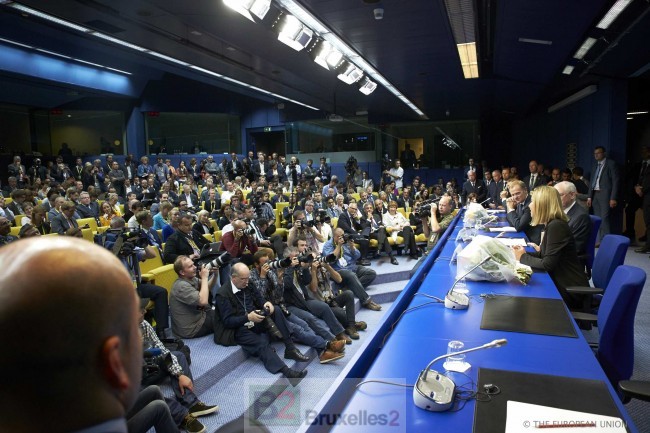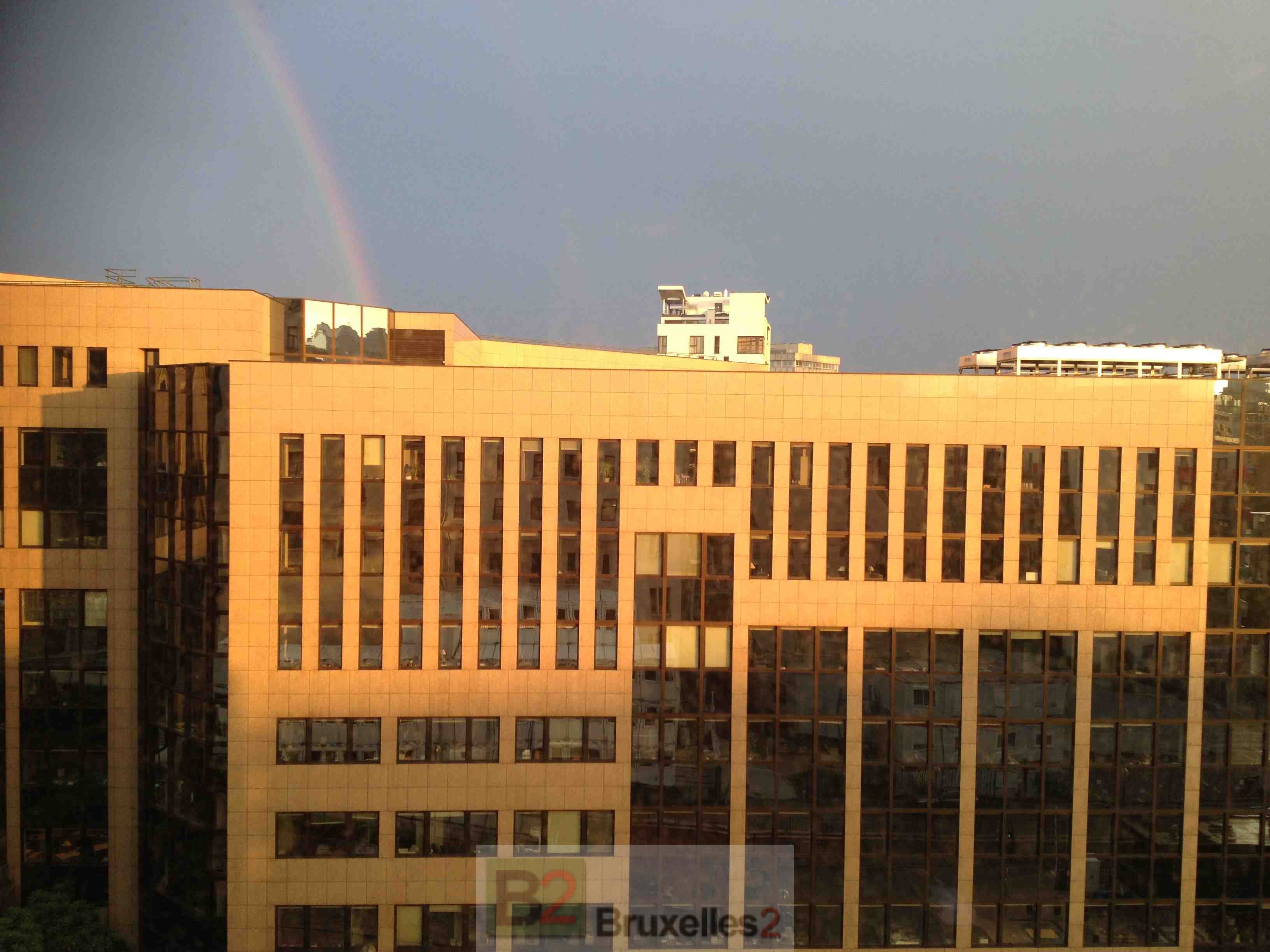Jean-Claude, Martin, Donald, Federica… The European quartet is in place

(BRUSSELS2) Federica, Jean-Claude, Donald and Martin... the European quartet is in place: Germany's Schulz in the European Parliament, Luxembourg's Juncker in the European Commission, Poland's Tusk in the European Council and Italy's Mogherini as High representative... Everyone in their own way has done quite well on their first passing exam. And it's time to say it...
Stop the grumpy and grumpy of all kinds!
The grumpy will certainly be able to find one too old, one too young, the third not multilingual enough and too direct, the other too pusillanimous... everything today, or that we give too much space to new countries, that another team would be much better, etc. Effectively ! We can always wish for better, other heads, a team + shock. But supposing that it exists, this shock team - this idealized and never realized quartet - would not resist 33 minutes in the European sphere. And he would quickly wear himself out in the face of the coming storms. In fact, let's say it straight and bluntly. This quartet presented if it results a bit from chance, pressure from each other, if it is not perfect, turns out - in the end - a choice... almost perfect! Both individually and collectively. There is a bit of the alloy of goldsmiths in this composition.
A much better team than the previous one
This new European "dream team" is undoubtedly better than the previous one. Recall five years ago! the already worn-out Barroso, the ineffable Van Rompuy, the total unknown Ashton and the sympathetic Buzek, it was really not terrible. And certainly not up to the challenges that Europe had to face. This quartet did not really prove to be up to par in its individualities than in the collective.
Commission President José-Manuel Barroso did not serve the second term he had announced and which he himself was aiming for. The High Representative Catherine Ashton multiplied the blunders and errors at the start, certainly gained experience over five years, but she was never able or able to express a little clearly what a European foreign policy was, apart from "we are concerned ". As for the President of the European Parliament (in the first 2 1/2 years), Jerzy Buzek, he certainly symbolized a "New" Europe but that is not enough to make a mandate, when obliteration is the rule.
Only the fourth thief, the President of the European Council, Herman Van Rompuy, who played the card of discretion from the start, has more or less pulled out of the game. In European circles, we salute his work. Indeed Herman has played his role as mediator of the 28 leaders, avoiding too many crises. But it must be recognized that he did not really symbolize, either, all the hopes that we had placed in this position: to symbolize Europe, to give body and heart to the European Union.
A new dream team?
So there you have it, with these 4 today, we have a team that is undeniably better able to govern Europe, to give a little dream, and above all to be a little more reactive than the previous one and to take the appropriate decisions in the next 5 years which will not be easy. Each is of a higher rank than its predecessors, in political force and symbolism.
Two fine connoisseurs of European workings
With Jean-Claude Juncker, at the European Commission, we have a very fine connoisseur of the workings of Europe. He knows everyone, the bravado or cowardice of some, the wills and red lines of others. He knows the power of the European executive, as well as its limits. And that will undoubtedly be part of its first task: to restore the heart to the work of civil servants, competent, but a little disillusioned by the last years. He's a fine waver, perhaps a little too much say his detractors. But he loves Europe and is determined to succeed in his mandate (it's a bit like the culmination of a lifetime spent on European issues). His age is only as valuable as his experience. He proved it in July at the European Parliament, succeeding beyond all his hopes in his first official hearing.
Martin Schulz succeeded in its bet: to be renewed in the European Parliament. It's not nothing. The German Breton wanted the post of the European Commission. He did not succeed. Far from going to brood over his resentment in a foothill of Aix la Chapelle, he decided to return to battle and obtain this renewal at the assembly. Good news. Schulz has succeeded in giving the post of President of the European Parliament a little vigor, political sense, sense of commentary which he has lacked for several years. It changes from a few predecessors. I would be charitable if I withheld their names. He too, like his alter ego at the Commission, shares a real European sense but also economic or social realities, the ultimate, he speaks French more than perfectly, understanding French politics, probably better than many French socialists. .
A fresh breeze from the East and South
With Donald Tusk at the European Council, a bit of fresh air from the East enters the cozy atmosphere. Donald is not just anyone. With the Kaczyński brothers, she got off to a bad start. And Warsaw is today one of the engines of European integration. Tusk - and his government of the Civic Platform - have been able to forge alliances, with Berlin of course, but not only, with London and Paris as well, according to the interests of each other Atlanticist at the start, liberal at heart , he proved that Europe was not just a market. It made difficult reforms in the country, obtaining the bet to be reelected. And Poland got through the crisis without too much damage. It is undoubtedly one of the countries which has been able to make the best use of European funds and is today one of the engines of European integration. A man from the East, Donald will remind certain Member States and certain sectors of public opinion that Europe does not stop at Berlin, but continues beyond: from the borders of Leningrad to the Black Sea, and that there is no need to speak French to be at the heart of European integration.
Last but not least, Federica Mogherini. This Blog will surely come back to it on several occasions. We may be able to qualify our statement in the future, or even find criticism. But today let's not spoil our joy. Federica is the one who undoubtedly embodies a change of style at the head of European diplomacy. Foreign policy finally has a face, a word, a voice, an outfit. Admittedly Mogherini is not a smart watch on diplomacy like Lavrov, Védrine... But she is not a newcomer, unlike some of her detractors. To be blonde does not mean to be uneducated. She grew up a bit in international politics, first on the benches of the university and then in the corridors of the Democratic Party. To have someone who has done their thesis on " the relationship between religion and politics in Islam is not entirely useless in these turbulent times when the understanding of the Arab and Muslim world deserves a little attention.... Perhaps more useful than 35 years spent panting leather in diplomatic plows! Her first steps on Saturday at the Council showed that she had worked on her files a little. But that she was also very political, not disdaining to collect herself with current European problems (youth unemployment, the economic crisis, etc.). Let's bet we'll see her again.
Don't sulk!
In any case today, it would probably be stupid not to sulk his joy. Europe has finally rediscovered, with these 4, (not counting the few surprises that the composition of the College of Commissioners could reveal to us) a pace, a desire for Europe, which it had not succeeded in having before. So, yes, today, we can talk about a "dream team". And there will always be time tomorrow, to qualify this statement and to criticize... when there will be criticism and action. In the meantime, we can really tell them "good luck". Because with the current crises (see box), this dream team does not have a dream board to manage...
(Nicolas Gros-Verheyde)
Europe on the brink of rupture
In short, Europe is on the verge of three ruptures and many choices.
- An economic break, with real stagnation, the austerity plans are at the end of their effectiveness, and if we don't want to experience a new economic collapse, we will have to play shrewdly and courageously, and probably abandon some somewhat doctrinaire attitudes (on the 3% deficit, the 60% debt, etc.).
- A political risk. There are few governments that are not on the verge of suicide. The instability is such that one does not know if the most secure government cannot fall the next day. Early elections follow one another. Movements, without an old political base, born of the crisis, are gaining an esteemed place on the political scene. And extreme, even frankly racist ideas are gaining ground. Two European regions - Scotland and Catalonia - claim "independence". If the step is taken, it could give a boost to a few others who are just waiting for a signal.
- Security threats. With the conflict which continues in Ukraine with Russia - and the will of some countries to push to fire -, the war which worsens in Iraq-Syria with the Islamic State, the Libyan "brothel", the Tunisian risk, etc all this at the gates of Europe is not going to give our quartet much rest.
Read also: The Europeans placed before their responsibilities. A Russian Dilemma
